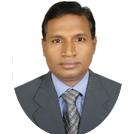
Prof. Md. Abdul Karim
Laboratory of Environmental Microbiology and Biotechnology, Department of Botany, University of Dhaka, Dhaka 1000, BangladeshSpeech Title: Characterization and screening of potential biofilm producing bacteria from polyethylene terephthalate bottles undergoing biodegradation
Abstract: One of the most used synthetic polymers is polyethylene terephthalate (PET) which is mostly used in water bottles and packaging material in the food and beverage, agricultural, aerospace, automotive, and medical industries. However, large amounts of nondegradable PET waste rapidly accumulate in ecosystems worldwide and have become a global issue. In Bangladesh, plastic use increased 3 times within 15 years due to the inadequate recycling of plastic waste. Only 20% of these bottles are reused, while 80% are discarded. Post-consumed PET bottles were collected from natural habitats. About 260 bacterial colonies were isolated in nutrient agar, Luria Bertani agar, and Peptone, Yeast Extract, Glucose agar media. The isolates were studied for morphological, microscopic, physiological, and molecular characterization. A modified carbon free basal medium was used for the assessment of PET degradation potentiality of the potential isolates. The biofilm formation capacity of the isolates was also investigated both qualitatively and quantitatively. The isolated bacteria were Bacillus, Listeria, Brochothrix, Pseudomonas, Enterobacter, Citrobacter, Morganella, Cedecea and Serratia. The diverse nature of bacterial growth and thick biofilm formation revealed that the isolates are enabled to attach the PET undergoing degradation. The formation of thick biofilm with high growth efficiency was observed in isolate P2/18/1 and Sp2/3 in carbon free basal medium. The biofilm formation results revealed that 93% of isolates were able to form biofilm, whereas 31% of them were strong. The results suggest that the bacteria have potential for PET degradation.
Biography: Dr. Md. Abdul Karim is a Professor and Principal Investigator of bioremediation of wastewater, microbiota in fish guts and seasonal dynamics of bioaerosols in the capital city in the Environmental Microbiology and Biotechnology Laboratory, Department of Botany, University of Dhaka, Dhaka 1000. He earned his PhD at Ehime University, Japan. Research in his lab focuses on understanding how to evaluate and control microbial activities in eutrophic environments. His current project includes 1) Bioremediation of eutrophic environments, 2) Seasonal variation of bioaerosols, 3) Characterization of hydrocarbon and textile dye degrading bacteria, 4) Isolation and characterization of multidrug resistant bacteria from environmental samples and hospital wastes; 5) Microbiota in fish guts and their antibiogram; 6) Characterization of polyethylene, polypropylene, and polyethylene terephthalate plastic degrading bacteria, and 7) Understanding of how pathogenic bacteria can survive longer period in adverse condition in association with other microorganisms and their interrelationship. He has supervised over 34 postgraduates and PhD. He has published 67 peer-reviewed papers in microbiology, author of 12 book chapters and 3 research books.
Prof. Karim is a member of editorial board of Bangladesh Journal of Botany (BJB); Science International; World Journal of Applied Sciences; International Journal of Biosciences; Journal of Biodiversity and Environmental Sciences; Microbiology Research International, Journal of Biological Sciences. He was awarded by the University Grants Commission in recognition of his outstanding performance in his field.

